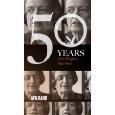
In mid-1962, Playboy founder Hugh Hefner was given a partial transcript of an interview with Miles Davis. It covered jazz, of course, but it also included Davis’s ruminations on race, politics and culture. Fascinated, Hef sent the writer—future Pulitzer-Prize-winning author Alex Haley, an unknown at the time—back to glean even more opinion and insight from Davis. The resulting exchange, published in the September 1962 issue, became the first official Playboy Interview and kicked off a remarkable run of public inquisition that continues today—and that has featured just about every cultural titan of the last half century. To celebrate the Interview’s 50th anniversary, the editors of Playboy have culled 50 of its most (in)famous Interviews and will publish them over the course of 50 weekdays (from September 4, 2012 to November 12, 2012) via Amazon’s Kindle Direct platform. Here is the interview with the novelist and philosopher Ayn Rand from the March 1964 issue.
Author

Polemical novels, such as The Fountainhead (1943), of primarily known Russian-born American writer Ayn Rand, originally Alisa Rosenbaum, espouse the doctrines of objectivism and political libertarianism. Alisa Rosenbaum entered into a prosperous Jewish family before Russian revolution. When the Bolsheviks requisitioned the pharmacy that Fronz Rosenbaum, her father, owned, the family fled to the Crimea. Alisa returned to the city, renamed Leningrad, to attend the university, but relatives already settled in America and in 1926 offered her the chance of joining them. With money from the sale of jewelry of her mother, Alisa bought a ticket to New York. On arrival at Ellis Island, she changed into Ayn (after a name of some Finnish author, probably "Aino") Rand (a supposed abbreviation of her Russian surname). She moved swiftly to Hollywood, where she learned English, worked in the RKO wardrobe department and as an extra, and wrote through the night on screenplays and novels. Because her original visa as a visitor expired, she also married a "beautiful" bit-part actor, called Frank O'Connor. Rand sold her first screenplay in 1932, but nobody bought We the Living (1936), her first novel and a melodrama, set in Russia. Her first real success was The Fountainhead (rejected by more than ten publishers before publication in 1943). She started a new philosophy, known as objectivism, opposed to state interference of all kinds, and her follow-up novel Atlas Shrugged (1957) describes a group who attempt to escape conspiracy of mediocrity of America. Objectivism has been an influence on various other movements such as Libertarianism, and Rand's vocal support for Laissez-faire Capitalism and the free market has earned her a distinct spot among American philosophers, and philosophers in general.